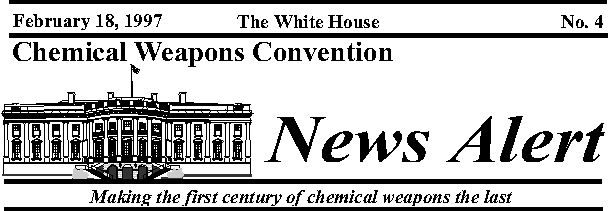Baker, Scowcroft, Deutch spell out their support for the treaty
In separate Op-Eds to the New York Times and the Washington Post, former Bush and
Clinton Administration officials outlined why the CWC is in our national security
interests.
President Bush's Secretary of State James Baker wrote in the New York Times Feb. 16:
"In an ideal world, rogue states and terrorist groups would simply give up the use of
chemical weapons. But ours is not an ideal world. The Chemical Weapons Convention
recognizes that, and so should its opponents. It makes no sense to argue that because a
few pariah states refuse to join the convention the United States should line up with
them rather than with the rest of the world. ... If we fail to ratify the convention ...
we will imperil our leadership in the entire area of non-proliferation, perhaps the
most vital security issue of the post-cold-war era.
"The United States does not need chemical weapons as a deterrent. Any nation or group
contemplating a chemical attack against us must reckon with our overwhelming conventional
force and vast nuclear arsenal. Each is more than sufficient to deter a chemical
attack.
|
"Failure to ratify the Chemical Weapons Convention would send a message of American
retreat from engagement in the world. For this reason -- and because our national
interest is better served by joining the convention than by lining up with
pariah states outside it -- I support the treaty and urge my fellow Republicans to do
the same."
President Bush's National Security Adviser Brent Scowcroft and President Clinton's
former Director of Central Intelligence and Deputy Secretary of Defense John Deutch
wrote in the Washington Post Feb. 11:
"... rejecting a treaty of which we were the primary architects and instead lining up
with pariah states such as Libya, Iran and North Korea would do real damage to America's
international leadership, credibility and interests...
"... By joining the CWC, we can take advantage of its inspection procedures and reporting
requirements to make our own intelligence capabilities more effective, increasing the
chances that we will catch the cheaters...
"... this CWC will enter into force in about three months, with or without us. The central
question before the Senate is whether the national interest is better served by the
United States joining the CWC ... The answer to that question is a clear and emphatic
'yes.'" |


